#notmydisney
Text
Disney doesn't need to change "the formula." That's the last thing that Wish proves.
What Wish proves is that "the formula" only works when you know why the ingredients are in it, and you use them the correct way.
The Princess Character is meant to wish for only half of the movie's message, and go through an adventure that teaches her what the other half is; what her dream was missing. Ariel dreamed of understanding but she was missing love. Tiana dreamed of achieving her goals but she was missing faith. Jasmine dreamed of freedom but she was missing trust. Belle dreamed of adventure but she was missing being understood.
The Villain is meant to highlight the opposite of the movie's message. Jafar gets what he wants through trickery and manipulation; that's the opposite of Aladdin's "truth will set you free" message, and he gets imprisoned in a lamp. Scar thinks being a King is having his way all the time and can't learn from his past of living in Mufasa's shadow; that's the opposite of The Lion King's "Let the past remind you of your responsibility to selflessness." Gaston loves only himself and is always obsessed with appearances; that's the opposite of Beauty & the Beast's "true love is found within a heart of self-sacrifice." That's what makes them such good villains. (and that clear direction is what drives good villain songs, since Magnifico's is what everyone is talking about)
The sidekick is supposed to compare/contrast with the main character's qualities. Abu is a greedy thief, which is what everyone in Agrabah thinks Aladdin is; when he scolds Abu and teaches him selflessness, it shows us who Aladdin actually is. Flounder is easily frightened and looks at the glass half-full; when Ariel coaxes him and leads by example, we see her bravery and positivity reflected in Flounder's tiny character arc. Timon & Pumbaa do whatever they want all day just like young Simba always dreamed of; when Simba goes to live with them, he finds that "getting his way all the time" makes him forget who he really is and feel empty.
The setting is supposed to show off the characters and highlight the movie's message. Rapunzel's tower is designed to be pretty on the inside because of her influence; if it were too dark and prison-shaped, we'd wonder why she didn't work up the courage to leave sooner. Just like how Quasimodo has made his corner of the bell-tower beautiful, too; they're taught the world is cruel and they're not strong enough for it, but they make their own worlds beautiful enough to hint that that's wrong right from the start. Ariel's grotto is shaped like a tower with no roof so that she only has one window to the forbidden Surface, and it's the light that comes from that forbidden world into her dark grotto which literally makes her able to see human things differently. Tiana's apartment has no interesting features except her father's picture, a perfectly made bed, a drawer with no extra outfits but stuffed with tip money, and only two dresses; both of which are for work.
None of that is happening in Wish, because they didn't know why the formula ingredients are there. Disney needs to understand and return to the formula the right way; forgetting it was what got them here.
Asha learns nothing to add to her dream, unless you count "the power to grant wishes is in me." Which you shouldn't, because we didn't even know she was confused about that until the animals sang a song that was completely off-topic and she had the chance to jump in and sing "I'm a Star!"
Magnifico does not demonstrate the opposite of Wish's message effectively because his character has nothing to do with a philosophy against making wishes, and everything to do with power. (He is the strongest character in the film. But because the message and core concept of what wishes are are so bad, that's not saying much.)
Valentino, and Asha's friends, do not highlight anything about her character through compare/contrast. Valentino is brave and all over the place. Her friends are seven-dwarfs parodies. Happy, Doc, Sneezy, Dopey, Bashful, Sleepy, Grumpy. None of that contrasts with Asha's vague characterization of "cares too much." None of it compares to that characterization, either.
The setting is empty. There are no interesting details that teach you something about any of the characters. None in Asha's home, none in the neat-and-tidy one-dimensional forest, none in the Rosas square, and none in the bland, empty castle. Magnifico's study is the closest anything gets; there's a loose concept that all of Asha's friends have to work together to open the roof, and take a leap of faith to weigh the pulley system down. Unfortunately, none of these characters is shown struggling to work together, OR to take leaps of faith, at all, before this point.
The ingredients of the formula are in Wish. They're just not being used correctly. This is how not to use the formula; it's not the formulas fault. If it ain't broke. They should never have let people convince them to try and fix it.
#Disney#critic#wish#wish 2023#wish hate#Disney's wish#Disney criticism#wish Disney#get it together Disney#real Disney#realdisney#notmydisney#Mulan#Tangled#The Little Mermaid#The Lion King#Aladdin#Meta#writing#writing advice#Disney princesses#Princess critiques#the Disney formula#formula#character analysis#animation#set design#Rosas#Magnifico#Asha
2K notes
·
View notes
Photo

What the hell Almonte! Definitely not the Donald Duck I remember. Exploring Almonte with @nonabakes #notmydisney #notmydonaldduck #disney #donaldduck #ducktails #almonte #ontario #canada #ontariosfinest #thriftstorefinds #babyonboard #stillwaitingonbaby (at Almonte, Ontario)
#donaldduck#ontariosfinest#thriftstorefinds#notmydisney#ontario#canada#babyonboard#almonte#disney#notmydonaldduck#ducktails#stillwaitingonbaby
0 notes
Text
I remember during the making of Tangled, the filmmakers said they had to work hard to design Rapunzel’s tower to be beautiful and seem like a cozy, fun environment, while also making Mother Gothel seem sweet and loveable, if manipulative.
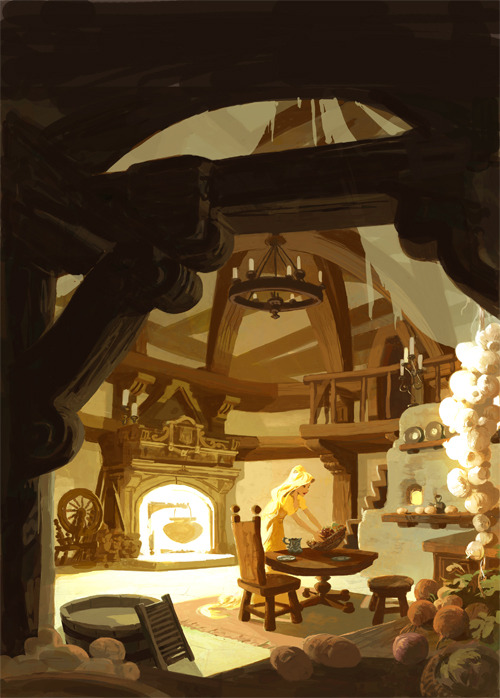
Because, they said, if the environment is too much like a prison, and Gothel is too much like a villainess, the audience wouldn’t believe in Rapunzel as a character. They’d think she was either stupid or cowardly, to stay in such a nasty situation without trying to escape sooner. But if her circumstances seem just livable enough, just sweet enough, that you can see some of the appeal, then you wouldn’t blame her for waiting so long to leave.
Why didn’t they do that with Wish?
Why didn’t they think that relatability through?
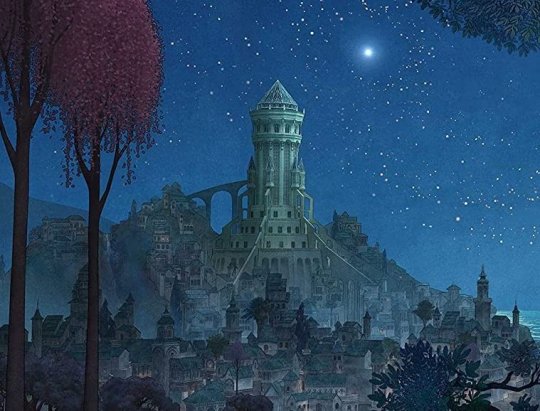
Nobody is really feeling compelled to root for the everyday Rosas citizens during the movie. You don’t feel like rooting for Asha’s cause, or even Queen Amaya’s. Because you think to yourself, “why did it take the townspeople so long to ask the question ‘why can’t we just have our wishes back?’”
Asha comes up with those culture-breaking questions, inexplicably, in the first twenty minutes of the movie. It takes the rest of the townspeople about 24 hours to suddenly start asking that, too.
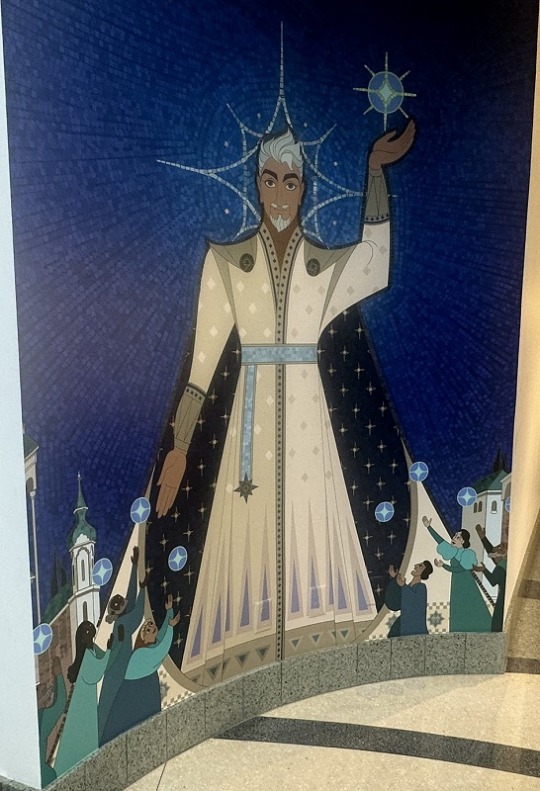
So why don’t you root for them?
Because when something bad happens to them, part of your brain goes, “why didn’t they see that coming, though? Why didn’t they ask questions? That one’s a little bit on them.”
And you don’t really feel that feeling you got with Mother Gothel, where you were like, “Oh yeah, I can see why the main character trusted this villain; the villain really seems to care about the hero, if you didn’t know what she was after.” You don’t;t get that same feeling with Magnifico. Because the whole idea of what he does—by erasing people’s memories and yelling at them and having no moments with regular folk where he’s warm and personal and building trust—is so malicious that we don’t believe the other characters couldn’t see it.
We COULD HAVE believed it. If they’d added in good writing and character moments to make it believable.
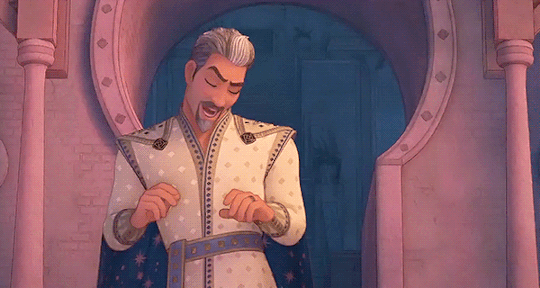
When Magnifico interacts with the people who trust him and are duped by him, he’s up on a stage, flashing superpowers they don’t have and then disappearing back into his tower after only granting one wish. He’s not on the welcome tour with Asha. He doesn’t know his own palace staff by name. He’s done nothing to build the trust all the side-characters unquestioningly give him. So even at the end, when everyone’s like, “aw, we wanted to believe in Magnifico,” we don’t feel it. Because didja? Why? Everyone could see that coming.
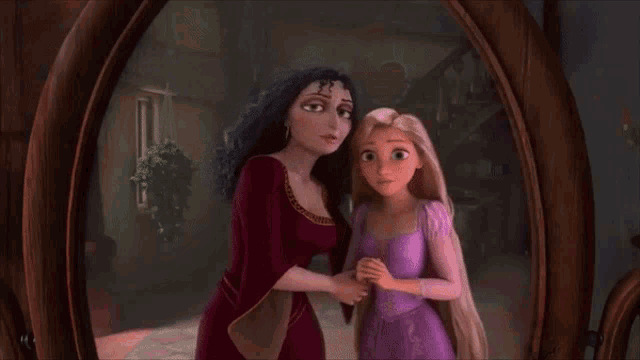
Meanwhile Mother Gothel tells Rapunzel she loves her most every time she leaves. She laughs with her. She reinforces every conversation they have with the idea that she’s desperate to protect Rapunzel. She brings her her favorite soup as a surprise and remembers the ingredients. She goes to get white paint on a very long trip so Rapunzel can paint. She compliments her strength and beauty—even if it’s backhanded. She calls her “dear,” and “darling.” She knocks thugs out with sticks, returning even after she argued with and supposedly ‘gave up’ on Rapunzel, all to supposedly’ protect’ her. So when Rapunzel realizes it was all an act, and she’s wrathful and furious and grabs Gothel’s hand, we DO feel it. Because we believed that Rapunzel really didn’t see this coming, so the shock stings worse. We don’t blame Rapunzel, and we do blame Gothel.
Just another example of what #NotMyDisney forgot about themselves.
#Tangled#wish#Gothel#mother Gothel#rapunzel#asha#Magnifico#wish hate#meta#conceit Art#criticism#analysis#character development#writing tips#character analysis#animation#Disney#NotMyDisney
343 notes
·
View notes
Text
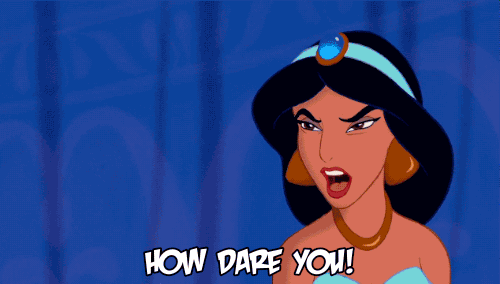
If you actually hate how Rachel Zegler disrespects the original Snow White and the Seven Dwarfs, do not go see or stream the remake.
If you actually hate how Disney has turned the Lilo & Stitch live-action into a bad statement about race, do not go see or stream it.
If you actually believe that the original The Little Mermaid was perfect and needed no adjustments, and Eric was not a bland prince, do not go see or stream the remake.
If you actually thought that Emma Watson misread and mishandled the role of Belle, who, in the original, was expertly characterized, do not go see or stream the remake.
If you actually believe that the Genie wanted to be free, and Aladdin learned to trust, and Jasmine taught them both how, while the Live Action version ruined that, do not go see or stream the remake.
If you actually believe that the original Lion King movie was perfect and needed no bland NatGeoWild embellishment, do not go see or stream the remake.
If you actually believe that the Cinderella (2015) movie was a good remake, go out and buy the DVD—and then don’t go see and stream the other remakes.
Don’t do it. They don’t read our tumblr rants or watch our rage reels, but they count how many of us go see the new stuff. And they count our money as it goes into their bank account to fund the next one. And they count the time we spend on their streaming services. Teach them that we have standards, and the standards aren’t spectacle, and you can’t just buy us with soulless puppets of our favorite movies.
When you’re tempted to go hear the soundtrack play and listen to the dialogue you miss, just go watch the original. That’s what you really love.
#NotMyDisney alienated me with these last few movies, so I’m not playing the games anymore. Make movies for me, as if I’m the smart child you raised on good movies, or else I won’t go see them. If you guys want me, I’ll be waiting for the day that the Live Action Remake comes out, and then immediately streaming the original on Disney+.
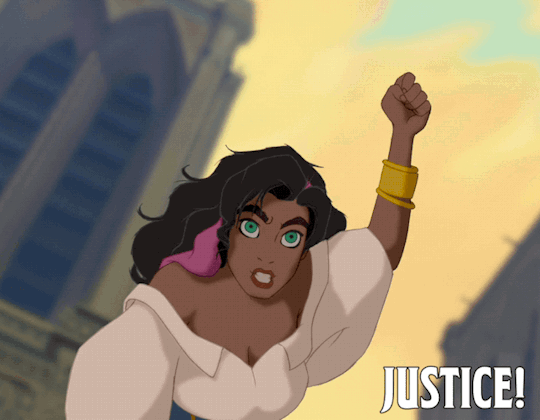
Let ‘em measure how many seats are filled in their theaters, versus how many streams of the originals are playing on the same day.
#Disney#woke Disney#notmydisney#not my Disney#live action remake#the haunted mansion remake put me over the edge#Snow White 2024#the little mermaid 2023#the Lion king 2019#Lilo and stitch 2024#Esmeralda justice#do not go see it#do not stream it
418 notes
·
View notes
Text
And another thing—the whole premise of Asha’s motivation, her whole character, is that she believes the people of Rosas deserve “more” than what Magnifico is giving them.

And I’ve already made posts about how that’s already kind of lame, because the movie doesn’t give you a good look at the citizens of Rosas really “suffering” because of Magnifico. They’re not all dull, or diffident, or zombies or anything. So she’s not really rescuing them from anything too bad, in that sense.
But that’s not the point of this post.
The point of this post is that Asha believes all the wishes in Rosas deserve the chance to come true, because she believes that all the intentions of the people in Rosas are basically good…she believes they’re all basically good people.
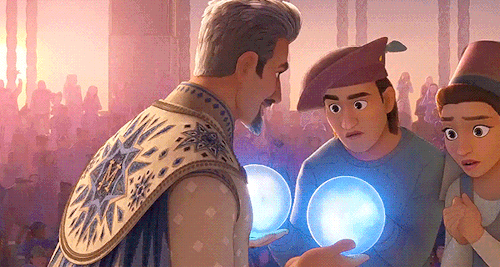
All their wishes are, therefore, good, harmless wishes.
But that’s so boring. And untrue. Not all wishes are good! Very few of the things we choose to wish for are the best things we could choose to wish for. And even less of the things people wish for are what they actually need.
Wish makes a lame attempt at the end, with the clunky Peter-Pan background character, to suggest that what the people of Rosas were missing was a work ethic to achieve their dreams, and collaborate with others, themselves.
But it’s lame. And still not compelling. Because not everybody has good wishes. In fact, almost ALL of Disney’s best stories are about a character wishing for something that isn’t completely good for them. I already made a post that was kind of about this, but seriously.
Having characters who want something, then discover that something is not so good for them, or something else would be even better, is one of Disney’s trademark tools for making compelling characters and adventures.

Flynn, in Tangled, just wanted to live a life of ease where nobody could bother him or take anything from him. And you know, he’s an orphan. They explained why he has that bad wish, because of his life and the circumstances that made him how he is—so we understand. We don’t hate him for having a bad wish. We get it. But then it’s wonderful to watch him learn to wish for something better! That’s a big chunk of the story! Just like how Rapunzel wished to see the floating lights, because it meant exploring and understanding the world. Not a bad wish, but not everything she could’ve had. Love, with Flynn, was an even better wish.
You could do this with villains, too, as the opposite. You can say,

Gaston had a bad wish. He wished to have Belle, simply because she was the most beautiful girl in town and he felt like he “deserved” her as the most beautiful man in town—and didn’t want to settle for second-best. And he has plenty of evidence to look at in order to recognize that his wish is bad, it’s not good for anyone including him—he has Belle’s selfless love for her father, the Beast’s refusal to fight back, and other adoring girls who would love to have him. But he won’t let it go. He won’t give up his wish or change it to something good—because he won’t acknowledge that it’s bad. So you have a great villain.
You get lots of great villains that way. Having bad wishes, but refusing to give them up. I mean, every Disney villain has a dream too, you guys realize that? And Disney had no problem saying “some wishes are bad” then. So they had strong characters with believable motivations/performances and a gripping story. Plus, actual impactful morals.
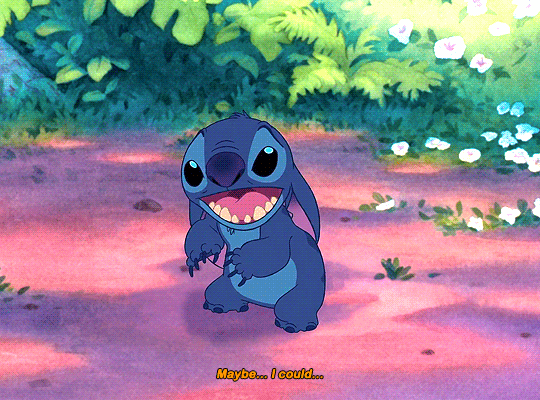
Stitch realizing his wish to destroy is bad, and changing it to a wish for family, like what Lilo and Nani have.

Clayton wishing he could “conquer” Africa, right down to selling its most fearsome creatures, right down to refusing to give up in a fight with Tarzan and winding up getting killed for it.
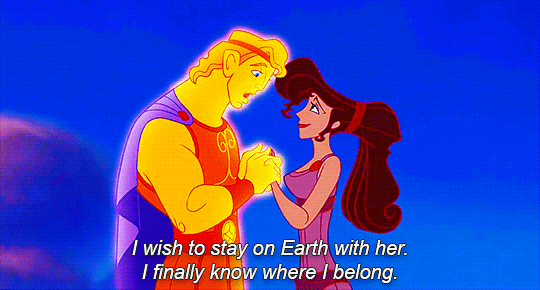
Hercules changing his wish from being a god to being on earth with Meg, because that’s a better fulfillment of his previous wish, which was just to find where he belongs.
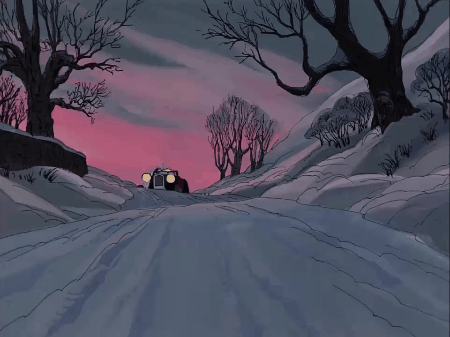
Cruella refusing to change or give up her bad wish for a fur-skinned coat made from the pelts of the pets of the friends who insulted her.

The fairies continually giving up their wishes to do what’s best for Aurora and the kingdom—they give up their magic when it fails to undo Maleficent’s curse, then they give Aurora herself back to her real parents even though they’ve loved her, then they put the whole kingdom full of their friends to sleep to spare them the heartbreak of losing Aurora.
I mean, you could think of this as Part II of my earlier post, but what I’m saying is, Wish doesn’t acknowledge one of the most fundamental things about Disney stories: wishes aren’t always good, and they’re not always good for the people making them.
I get that Magnifico was taking away the chance for Rosas to find that out for themselves. No character in Rosas gets to go on their own journey of “is my wish worth getting.” But basing a movie off of that set them up for a boring movie. The whole concept of forgetting the wish you have, but it was probably good/harmless, makes the characters stop being characters, and the story super bland.
The only character that has a wish that he tries to make come true and has to choose to either keep or let go of is Magnifico—and his wish is “maintain absolute power.” Not even the Evil Queen had a wish that was that one-dimensional and bland—at least she had something personal in there. Magnifico doesn’t have a backstory or a personality that hints at a backstory which would explain his being a control-freak. He just has a burnt tapestry hanging on a wall that he sometimes glances at and says super vaguely, “nobody should ever have to live with their wish not coming true!” What wish, Magnifico? What did you wish for that you didn’t get? Say something that makes you real to me, or else I don’t care. Like everything else in this movie.
#Wish#Wish 2023#wish hate#wish love#wish critique#critique#2023 movies#animation#animated movies#animated movies 2023#notmydisney#meta#Tarzan#101 Dalmatians#Lilo & stitch#stitch#Hercules#Meg#megara#Disney renaissance#sleeping beauty#Asha#Magnifico
211 notes
·
View notes
Note
You know... it also just seems really weird that Disney has been going out of it's way to subvert everything from its past.
If I put myself in the mind of "everything we were founded on, and everything we create before ~2016 was bad" I don't see why I'd keep going. Like... if Disney thinks Disney sucks, why be Disney? (money IG)
You're right! It must be a very discouraging thing to work for Disney nowadays, if you're the kind of person to think about legacy, or occupy your daily thoughts with some degree of foresight.
The truth is, there is a part of Disney that is successful because it was innovative--it raised the bar and set the culture.
But there's also a part of Disney that is trying to guess what the culture likes, and capitalize on that popularity--the culture tells it what to do.
That's all organizations. Some are brave and say, "no, this is who we are and what we believe, and you can take it or leave it." And usually the culture takes it, because the culture is inspired by strong leadership and clear identities.
But then they get a big following. And it's almost impossible for the organization that used to shape the culture to do anything but become terrified that they'll lose that culture. So then they start making decisions based out of fear, and self-glorification, and insecurity--the total opposite of the confident, bold, innovative identity it used to have.
Disney used to say "oh you think cartoons are just gags? Let me invent the first ever animated feature film--in color! See you in the National Film Registry, skeptics."
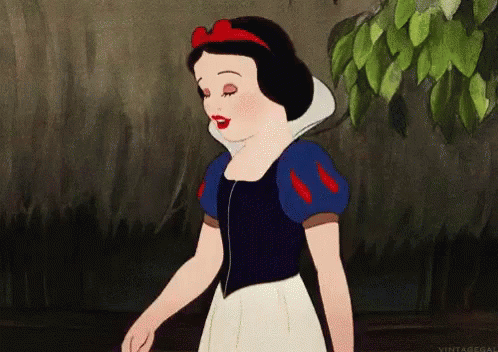
It used to say, "oh, you critics think all my fairy tale and animal movies are too light? That they've got no weight to help the kids face real life? Let me make a smash-hit about a Nanny who convinces a work-and-harsh-realities-obsessed father that what his children really need is a spoonful of sugar. Because yeah, life's hard, but that's why we make the job a game."

It used to say, "you think the animated genre died with Walt? You think everyone would rather watch George Lucas movies than a cartoon fairy tale? Let me introduce you to an Academy Award-winning Princess story we call the Little Mermaid. You can stop digging our grave; we just saved animation."
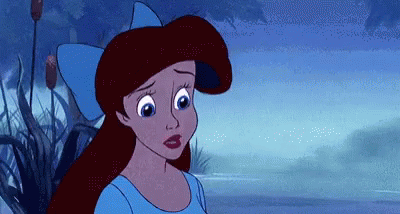
It used to say "you think it can't be done? Hold my mouse ears." And it just did it. And didn't care if audiences said silly, shallow things like "girls don't need to be rescued by a prince!!1!" Or "grown-ups don't watch cartoons lol!!"
Nowadays, though? They're so big they don't know who they are anymore. And they're so big they're scared to lose anything, or take risks. I'm sure there's a lot of political pockets involved, too. They don't dare say anything but what the loudest, most complaining members of our society tell them to say.
They're no longer trend-setters and trail-blazers. They're a monument that is whatever the loudest people tells them to be. Has to suck, when you're the company that followed Walt's "Keep moving forward" motto.
#Ya made me sad#I loved them#but good ask#asked#answered#Disney#there's a great big beautiful tomorrow#Tomorrowland#Disney company#notmydisney#not my Disney#real Disney#realdisney
160 notes
·
View notes
Text
Okay, signing off after this, I promise.
But if you saw WISH this past weekend and hated it like I hated it, help me warn other people off of it. Do not go give your money to this movie. I watched it the day after it released with my family, and it was an empty theater besides us: let’s keep that up.

I believed in going to this movie to give it a chance, because the Disney Feature Animation department has never let me down. Their live-action department? Yes. So I don’t go see those anymore. Their television department? Yes. So I don’t see those anymore.
But I went and saw this movie because they haven’t broken my trust yet. Now they have. It’s bad. Bad content, bad form. It’s lazy, because they know they can be lazy, and you’ll still fill the seats. It pushes a New Age humanist ideology, and it does so because it knows it can, because you’ll fill the seats and not expect anything more from them.
Expect something more. By not going, now that I’ve warned you.
It takes everything that classic Disney movies proclaimed, and it lazily says the opposite—but while it says the opposite, it throws Easter eggs of old Disney movies in there, and adds bits of “When You Wish Upon a Star” into the soundtrack, as if to pay tribute. When what it’s really doing is betraying. If you love any Disney Animated movie, don’t go see this one; it stabs those movies in the heart and then waves the bleeding things around on a stick like a celebration-parade-float. Don’t. Go. See it.
#Don’t go see it#if the movie stinks just don’t go#wish#Disneys wish#wish Disney#Disney#notmydisney#realdisney#real Disney#not my Disney#asha#Valentino#wish hate#wish love#review#Disney 100#100 years of Disney
164 notes
·
View notes
Note
What is, in your opinion, the worst Disney animated film?
It's Wish. Not just because that's the hot seat that I'm sitting in right now, but because just about every other Disney animated film pulls ahead of Wish in every other category.
Dinosaur (2000) had better voice acting than Wish.
Chicken Little (2005) had clearer and more compelling character motivations than Wish.
Brother Bear (2003) had more meaningful sidekicks than Wish.
Home on the Range (2004) had a more exciting story than Wish.
The Black Cauldron (1986) had better scene design and world building than Wish.
Atlantis: The Lost Empire (2001) had a main character with more of an impact than the main character inWish.
Oliver & Company (1988) had better songs than Wish.
Pocahontas (1994) at least included a purpose behind introducing the "topic" of diversity to the story through the characters (even if it was poorly executed given the context) while Wish had no discernible purpose for introducing it through their characters.
Even Disney's worst other movies have more going for them than Wish: usually where they failed was reading the room and picking an audience that would like it. Like, nobody was really interested to see Atlantis: The Lost Empire, or Oliver Twist but with cats and dogs.
Which makes it more painful: audiences wanted to see Wish. Everybody likes a new Disney musical fantasy-adventure movie. And this was supposed to be a celebration of everything people love about Disney, so that would've added appeal to the audiences of Wish.
But Wish took that and totally dropped the ball.
If you were hoping for a less-recent, broader ranking of Worst Disney Movies:
Wish
Strange World
The Black Cauldron
There ya go!
#Wish#Disney movies#asked#answered#worst Disney movies#wish 2023#Disney's wish#wish Disney#Disney#notmydisney#strange world#dark ages#animation#critique
80 notes
·
View notes
Text
Also, I’m just going to say it out loud—NOT EVERYONE believes in the New Age-inspired, simplistic, poetic turn of phrase: “we are all made of stardust.”
The truth of the matter is, we might have some of the same matter in us that stars do—but that doesn’t mean we have “the power of the stars.”
And even if we’re just meant to believe that, in the fictional world of Wish, alone, stars have power, and this is no commentary on our real world…it is still a commentary on our real world. Because all you’re saying is there is no higher power to plead to for your wishes to come true. “Stop trusting a higher power with your wishes and work for them, yourself.”
And you know what, #NotMyDisney? Not everyone in your audience believes that. You’re intentionally alienating us with your feature animation department, now. You’re directly trying to make us all believe what New Age philosophy dictates. You’re directly trying to get us to side with this humanist, self-centered ideology.

You didn’t used to do that.
When you made Pocahontas, Native-American spirituality might have been in it, but Pocahontas wasn’t about it. It wasn’t trying to make me believe that rocks have names and spirits, it was trying to make me believe that “love sees clearly, while hate blinds.”
When you made The Hunchback of Notre Dame, Catholicism might have been in it, but Hunchback wasn’t about it. It wasn’t trying to make me believe that Catholicism is evil and the Romani people are good; it was trying to make me believe that “what you are inside is what counts.”
When you made Cinderella, the idea of fairies which comes from Paganism, might have been in it, but Cinderella wasn’t about it. It wasn’t trying to make me believe that fairies are real and reward good behavior; it was trying to make me believe that “acting on the faith it takes to be good and kind regardless of your circumstances is powerful enough to set you free.”
But now that you’ve made Wish? New Age, Humanistic, Evolutionary worldviews are in it, AND Wish is about it! You’re trying to make me believe that I have something in and of myself that is powerful enough to render any idea of a higher power useless, and that I should place my trust in myself, alone.
No.
You’re losing me. I grew up with you, and you’re losing me. And I am not the only one you’re losing.
#notmydisney#NotMyDisney#RealDisney#Real Disney#Pocahontas#The Hunchback of Notre Dame#Quasimodo#John Smith#Cinderella#Ella#The Fairy Godmother#paganism#spiritualism#humanism#new age#stardust#Star#wishing Star#Disney#when you wish upon a star#wish hate#wish love#wish 2023#asha#Valentino#king Magnifico#queen Amaya#ariana debose#Chris pine#Disney hate
64 notes
·
View notes
Note
I feel saddened that Disney has lost their edge movie and villain wise. As Disney has had such a great rogues gallery in the past.
I really haven’t figured out what the new villains are missing. It’s either that there isn’t a true villain, like Abuela in Encanto or Namaari in Raya & the Last Dragon or Callisto in Strange World, OR the villain is a true villain, but because the message of the movie is poor, the villain comes off as poor, too.
I mean, I made a post about the formula of Disney a while back and how they need to remember what the pieces are for: the villains are one of those pieces. They’re supposed to embody the opposite of the movie’s message.
So in Wish, the message was weak. “You have the power to make your own wishes come true, so keep trying.” So King Magnifico was a weak character. He still almost-represented the opposite of the message, but because the message is so vague and the story didn’t build on it, he might be a “true” villain, but he’s not a good villain.
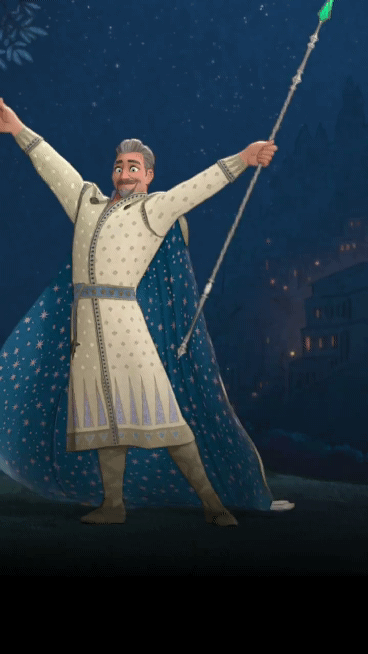
He represents the belief that “nothing you do on your own can make your wishes come true, so you should stop trying.” Kind of. Except, he himself believes that he has the power to make his own “wishes” (absolute power) come true—and everyone else’s. So his character falls flat. All that the audience is left to hold on to is Chris Pine’s charm, one-liners about his handsomeness, and empty stabs at chemistry with his wife.
What they could’ve done is had Magnifico be a true opposite to the movie’s message (vague as it is) and it might’ve been more impactful. Instead of being obsessed with keeping his own power safe (keeping his own wishes safe) he could’ve been the kind of King that is super-duper strict. Doesn’t even try to hide how strict he is. He could’ve had no magic, and in fact, magic is banned in Rosas and he tries to convince everyone that it doesn’t exist—
—because he believes the opposite of the movie’s message: “You have the power to make your own wishes come true, so keep trying.” He doesn’t believe anything good can com from reaching for “more.” Maybe the kingdom was magical once, and famous for being a place where new innovations and enchanted items came from, but then it was besieged because foreigners wanted it’s power when he was a young Prince, and the survivors were forced to flee to a secret island, and they re-established the kingdom of Rosas, but it was never the same.
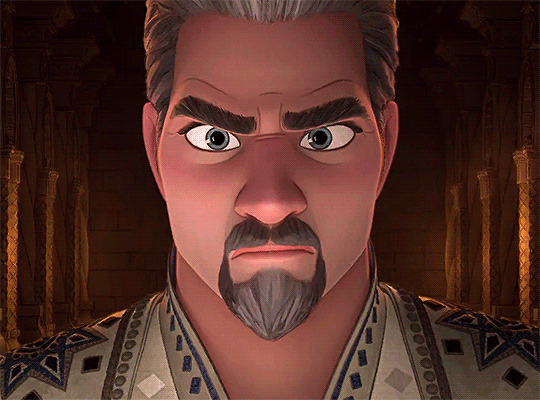
Because now young Prince Magnifico starts his rule as fearful King Magnifico, and he believes that magic, and innovation, and “wishing” for too much outside of your comfort zone, only invites trouble. It’s best to lead a safe, tightly controlled life with no risks. But his good intentions turn into an obsession with keeping the kingdom hidden and under control. So King Magnifico frequently holds fear-based memorials of Rosas’ history, and why magic is bad, and punishes anybody who makes too much bustle or tries to leave.
Everybody in Rosas lives according to tight schedules and curfews. They serve the King by making their kingdom fortified, but carefully hidden. No buildings are built over a certain height limit (kind of like an allegory for not looking up, not getting too close to the sun, whatever) and all old relics of magic that the refugees kept over the years are meant to be turned in. The citizens keep themselves busy by adhering to a strict schedule, where everybody is given the same rations of food, the same quiet farming jobs, rotating market days, etc. Because the whole idea is, “we’re in a hidden kingdom. The world is still looking for Rosas to take advantage of it’s magic. They can never find us—hopefully they’ll forget about us and leave us in peace and safety if we stay hidden and keep to ourselves and get rid of magic.”
Of course, this whole setting changes King Magnifico from a charming showman going on and on about his own handsomeness to a strict protector who’s public persona is a benevolent father-figure just trying to keep everyone safe, but under the surface he’s a dictator using “safety” to control with fear.
And the setting has to change Asha, too. Because you don’t grow up on a hidden kingdom where your whole life is on a tight, boring schedule and everyone keeps their heads down, and you’re the only one bubbly and ready to try new things. You don’t even know what that looks like; you’ve never seen anyone eager to dream or take risks or go exploring.
UNLESS, maybe your grandfather (who is barely a character in the original movie) remembers the old Rosas. And he has kept magic contraband from the time when innovation was the kingdom’s identity. And so while everyone else your age has grown up with hiding and boredom as the norm, you have a window into a world where things can be better and more magical. Sabino becomes what Scuttle was to Ariel, showing her pieces of a more wonderful world than the one she’s stuck in.
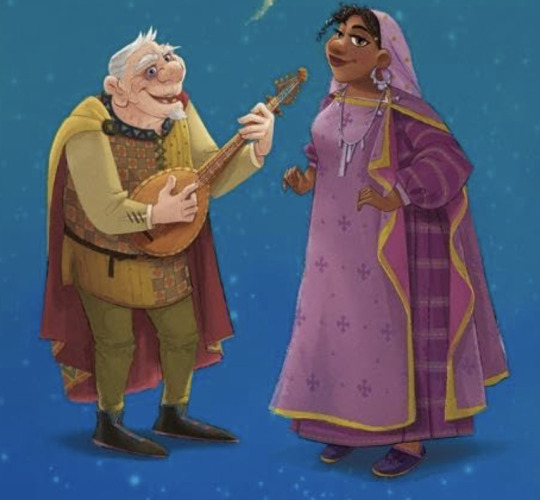
OR, instead of having a grandfather who makes her think magic and wishing is not what the King says it is, Asha could start the movie totally drinking the Kool-Aid. Maybe she, herself, agrees with the King, because she used to wish for things to get better and believe that her grandfather’s hidden magical artefacts were awesome when she was little…but then her dad got sick. And she wished and wished for him to get better, (but we’re actually shown that, instead of the throwaway line from Wish) and he didn’t, and it shattered her faith.
Or maybe she not only wished for him to get better, but she tried to do something and step out of line to make it happen. Maybe her dad got sick, and her grandfather took out like a magical cup from Rosas’ forbidden history, and said, “he might get better if we just got him to drink out of this, but the cup is broken” and like 7 year-old Asha really believed that was true, so she used a little tinkering gift she inherited to try and fix it. But it didn’t work, and he died, and so when we meet her she’s this pessimistic teen who loves her grandfather but kind of pities him and constantly has to shut him up and shut him down about magic because it doesn’t work and it’ll get him in trouble with the King.
But then through the course of the movie and an adventure that actually has good writing, she starts to have a little of that 7-year old hope that magic and wishing actually could make things better, even if it’s hard to pursue them and risky to take chances. And that brings her into conflict with the villain, who has the same belief she started with only more extreme, and the movie
..would actually be at least entertaining or even compelling, even if the message is kind of vague and bland.
I did not mean for this to turn into a Wish-rewrite, and I’m not even saying it’s a good one, I was just trying to process what’s wrong with Magnifico, the most recent Disney villain who falls flat, out loud 😅
#Thanks for listening to my rambling#wish#wish rewrite#rewrite#fix-it#asked#answered#Disney villains#Disney#Disney meta#NotMyDisney#king Magnifico#Asha#Chris pine#Writing#villains#animation#wish 2023#wish Disney#Disney wish
71 notes
·
View notes
Note
https://www.tumblr.com/the-sage-libriomancer/735649361333239808/rewatched-princess-and-the-frog-today-and-honestly
I saw this post and automatically thought of you. They are 100% correct.
Absolutely! You’re correct. Hey, @the-sage-libriomancer , I saw Wish and you’re still correct. The idea of having a star that is a higher power (Evangeline) and then having a character who demonstrates absolute faith in that higher power (Ray) and winds up teaching that same faith to both self-centered-Naveen and self-reliant Tiana? So very Disney.
Sometimes Disney’s Renaissance-era princesses were the Faithful Characters of their own story—Ariel had faith in Eric and taught that same faith to her father, Jasmine (and Genie) had faith in the Truth and taught that faith to Aladdin and the Sultan, etc. And that’s wonderful. Cinderella and Snow White are the Faithful Characters in their own stories, too, so it’s not like that isn’t a Classic Disney idea.
But Princess and the Frog doesn’t do that. It has the princess be the one who needs to learn to have faith. And the prince! That’s much more like dear old Pinocchio.
What Jiminy Cricket and Geopetto are to Pinocchio, Ray is to Louis, Naveen, and Tiana. I mean, how wonderful a tribute to Disney, to have the main character be afraid of relying in something higher, valuing love, and trusting only whatever she can accomplish on her own…
…to have her go from that to being willing to give up what she wanted? To value love, plain old love, over career, personal goals, dreams? To change her dream and admit when she was wrong? And finally, to sacrifice herself in order to do what’s right?
Why, that’s Pinocchio. That’s Mr. Banks from Mary Poppins. That’s Alice from Alice in Wonderland. That’s Disney!
Wish 2023 could never.
#Wish 2023#wish criticism#be my friend the-sage-libriomancer#Disney#Disney criticism#NotMyDisney#Not My Disney#RealDisney#The princess and the frog#princess and the frog#tiana#princess tiana#Naveen#Facilier#dr Facilier#Disney villain#Ray#Evangeline#the wishing Star#wish#asha#rosas
37 notes
·
View notes
Note
I saw your post about the Wish film and saw a quote that made me think about it. Amy Nicholson from New York Times is the one who said it: "-Can Asha, a humanist, convince the islanders to reject the man in the embroidered robe who preaches that he alone is a conduit for miracles?" and once I read that quote I know I'll never be able to watch the film without feeling yucky.
Hmm. I guess that's a pretty accurate way to phrase it! Asha's views do line up with humanism and Magnifico is wearing a robe and constantly saying "I decide!" about which Wishes get granted.
I hesitate to say the movie's argument against Christianity was direct, but it's a pretty sad coincidence if not. At least it's not ferociously attacking God quite as directly as Steven Universe did; but, like lots of movies nowadays, it could be doing what's fashionable and criticizing "organized religion." 🤷♀️
“If the world hates you, know that it has hated Me before it hated you." That's John 15:18. It might be sad that it's Disney this time, but remember, we've seen it all before, it's just part of the usual song and dance.

27 notes
·
View notes
Note
Oh yeah, the live action Snow White situation. They really picked the wrong person for the role of that sweet princess (even though I still find them making a live action remake for this pointless). She may have a good voice, but she has such a wretched personality. And we’re supposed to believe that she’s prettier than Gal Gadot, who’s playing the Evil Queen?
I don't know, I don't know Rachel Zegler's personality and I'm sure they'll take beauty completely out as any consideration in the movie. As per usual, they'll humanize the Evil Queen, or make her lust for power instead of being plan jealous. But they can't have their Snow White character be "beautiful," as a characteristic that causes change in the movie, because they're probably operating on the infantile idea that "women are more than just their looks and should never be associated with their looks."
Of course women are more than their looks. But in fairy tales, beauty without is meant to symbolize beauty within. What makes Snow White's beauty powerful in the real fairy tale is the fact that it is genuine: it reflects what her heart is like. That's the edge her beauty has on the Queen's false beauty. It's symbolic--and it shows how shallow the Evil Queen is, making Snow White an even better heroine by comparison.
But they won't do all that. Because they don't remember how to tell stories that are true and faithful, instead of stories that are simply pandering to whatever opinion the culture has moment-to-moment.
Anyway.
All that to say, it really never mattered if the actress they got was "prettier" than the actress they got to play the Evil Queen. You could easily look at the animated version and say that the cartoon Snow White isn't prettier than the cartoon Evul Queen. Because actual aesthetic beauty is, in most cases, in the eye of the beholder 🤷♀️ You might think Zegler isn't as pretty as Gadot, but the next person in line could completely disagree with you, and the next person in line might not have noticed either of them to be especially pretty at all.
That was never the point. They could get any two actresses and say "this is the Evil Queen, who is beautiful, and this is Snow White, who is more beautiful, and that's why the Evil Queen hates her," and what either of the actresses looked like wouldn't matter to the story. But again. The concept of "beauty" as a storytelling tool isn't going to be used in this retelling, I bet you money.
Gal Gadot and Rachel Zegler are good actresses. But they clearly don't understand the original story. And Zegler, at least, lacks respect for the movie her retelling is supposed to be based on. And even the very best actresses can't make up for that sort of thing, because good acting comes from understanding.
#Snow White#Snow White and the seven dwarves#Snow White and the seven dwarfs#snow#sw#live action Snow White#gal gadot#Rachel Zegler#Walt Disney#Disney#notmydisney#Not my Disney#real Disney#Snow White 2024
21 notes
·
View notes
Text
Disney might be all over the place in terms of quality and who they want to support vs. who they want to marginalize these days.
However, let’s remember that has not always been the case. Let’s remember that Disney invented the modern animated feature film. Not helped it along—not made it famous—invented it. Everything from modern anime to recent smash-hits like Across the Spider-Verse owes something to Disney.
Disney HAS BEEN a safe place, largely, for kids and families to enjoy good and true things. Let’s also remember that the current company is enormous and is made up of individuals, some of whom loudly or desperately disagree with the decisions made by the corporate heads or largest shareholders in the company. I know one, personally.
Movies like Lilo & Stitch were supposed to remind everyone what family means. Movies like Beauty and the Beast were supposed to remind everyone that love hopes all things. Movies like The Lion King were supposed to remind kids that responsibility doesn’t have to be a bad or selfish thing.
So when Disney does something that is sad or disruptive, I’d politely suggest that you don’t say, “$%!@ Disney!!!” or “Disney sucks.” Say what I say. “Not my Disney.”
Their "woke" corporate persona is very different from what it’s films and values seemed to be as recently as ten years ago. Think of it like a friend who’s not acting like themselves anymore. “#NotMyDisney” 🤷♀️
#just a thought#we wouldn’t have all these strong opinions if Disney hadn’t been something we felt positive emotions toward at some point#not my Disney#notmydisney#disney#disney world#woke Disney#anti woke#Glen keane#the little mermaid#the Lion king#Lilo and stitch#Mickey mouse#the mouse#disney politics#Anti-woke#it’s crazy how Christian Disney used to be#go look up Glen Keane; Tom and Tony Bancroft; Mark Henn; Ron Husband#or Jodi Benson for crying out loud
72 notes
·
View notes
Note
Raya and the Last Dragon popped into my head today and I kept thinking about how the incredibly unsubtle and poorly executed message of trusting others felt like a first draft.
What do you think about it? Would a revised script with the same story premise fix that film? Or was it doomed from the get go in what it was trying to say?
Good question! I go back and forth. I think the movie's biggest weak point was its writing, so I guess I'd say, "a revised script with the same story premise would fix it!"
There's nothing wrong at all with a message like "Without trust, we can't stand together." Because it's very true. Everyone has priorities, and there's always a chance they'll choose themselves over you, or over the "greater good." But if you keep trying to take control of the situation by believing the worst about them before it happens, you'll be exhausted & jaded, they'll be exhausted & jaded, and all your time and energy will be spent on competing with each other for the grand prize of "who can look out for their own interests better."
I think Raya and the Last Dragon's premise works for a truth like that. It makes total sense to have a girl who's competitive become jaded and control-freaky when her father, the symbol of the virtue of trust & good faith, is murdered by betrayal. And not just any betrayal, but betrayal from someone she directly tried to befriend and trust as a sort of "first experience" with that good faith her dad was always talking about. Makes total sense. And it's impactful; something that traumatic and personal would cause a relatable character flaw that the heroine needs drastic measures to overcome.
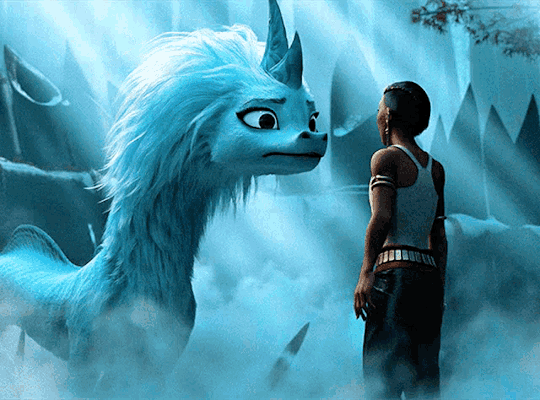
I actually love the concept of Sisu too. I like the idea that she's this pure, selfless soul who's got childlike faith—but, all the jaded people in a post-apocalyptic world respect and consider her worldview because she's a revered dragon. So she really does change minds just by being around them, just by coming back and existing in the first place. I mean, if she had been just a sheltered girl from, say, a different country, who came into the broken Kumandra with stars in her eyes, the bad guys wouldn't have thought twice about whatever she exemplified. But she's a dragon.
And step back and think about it: having a group of characters from every walk of life come together as a mini-experiment in trust and unity during the course of the adventure is a great idea. It's not flashy or original, but it's classic and true. Avatar the Last Airbender has a crew of characters from each tribe combining to defeat evil. When Kenai has a prejudice against bears in Brother Bear, how is that character flaw solved? Not just by him turning into one, but by him having to travel with and get to know one.
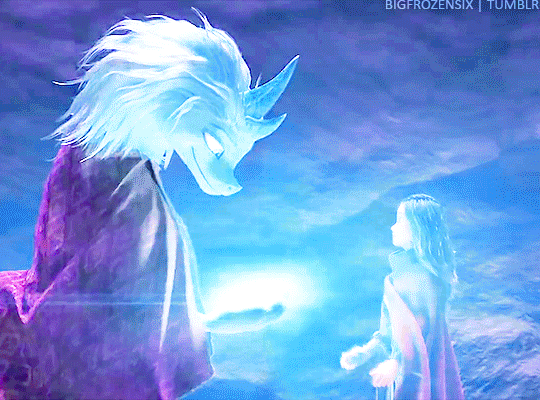
What they get to know is that they all have something in common: they've all lost people to the great evil in the world. And, they all want the same things, despite cultural differences. They all want their families back, they all want safety and success.
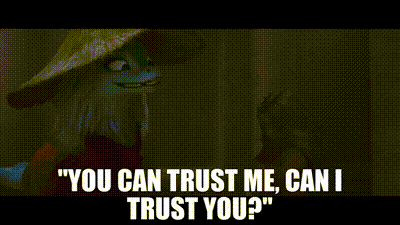
So yeah, the pieces are all there. The problem is, the writing was just super clunky. Theres a lot of telling, when it comes to the story, instead of showing. There's not no showing. There's just not enough.
I know this is already a long post, but I'll just point out: Aladdin's message had a lot to do with trust, too. But no character ever said out loud, "you have trust issues and you need to work through them." Certainly not more than once. The closest you get is Genie telling Aladdin to be himself.

Instead, you're just shown that Jasmine is the type of girl to give an apple to a hungry kid without even thinking about whether or not the shopkeeper wouldn't want her to do it. She's the type of girl who plays along with a scrubby boy from the marketplace trying to help her. She's the kind of girl who goes out with a Prince even though she has reason to believe he's already lying to her. She just does those things, and never says, "hey, why did you lie to me--you have trust issues!"
Meanwhile Aladdin's whole story is him bending over backwards to control what everyone thinks of him, because he can't trust them to accept him as he is. But he never says, "Trust gets me hurt." He just says, "if Jasmine knew I was really some crummy street-rat, she'd laugh at me."
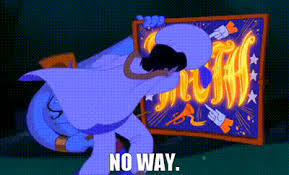
Those sentences that the characters say are well-written because they are realistic. Only in our modern psycho-babble Instagram-influencer culture, where everyone thinks they're an expert on the human psyche, are teenagers starting to say things like "My trauma causes me to struggle with trust."
What Aladdin says is much more immediate, much more down-to-earth than that. It shows where his brain is in that moment. He's not thinking about the general philosophy of truth and trust. He's just thinking about what he should or shouldn't say on his date, and how scary the idea of getting laughed at is. We, the audience, are smart enough to infer that it's all rooted in trust issues. We don't need Genie to deliver a speech six times to make it abundantly clear.
I'm capable of identifying that as the problem, but I'm not great at doing it, myself. I know the language, I'm not great at speaking it. But actually I'm going to punt this part of the question over to @doverstar , who is very skilled at "show, don't tell," especially in dialogue. How would you re-write that scene where Sisu is trying to convince Raya of the importance of trust?
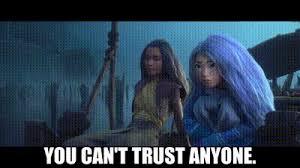
One final thing that I think handicaps Raya and the Last Dragon is that, because of the way they're written, the characters lose likability. Theres a way to have a traumatized, defensive girl who thinks she knows everything still be likable. Just like there was a way to have a selfish, insecure liar be likable in Aladdin.
I think there are other issues—I'd have completely written out the baby and the monkeys, and I'd have cut the fight sequences between two teenage girls way shorter because nobody cares about them. But that can be for another post.
#Trust#themes#theming#writing#show don't tell#raya and the last dragon#sisu#sisu the dragon#sisu the last dragon#raya#namari#kumandra#awkwafina#disney#notmydisney#Aladdin#Jasmine#animation#storytelling#writing advice#Doverstar#asked#answered#meta#analysis
15 notes
·
View notes